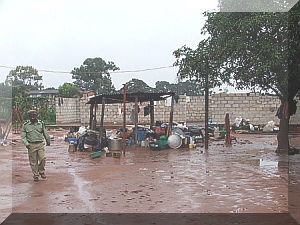Zambian Prisons: The Need for Judicial and Legal Intervention

 |
| Inside Chimbokaila prison yard, Lusaka Photo courtesy |
What will the Zambian lawyers and judiciary do about the recent Report by Human Rights Watch that decries the atrocious conditions of Zambians in Zambian prisons? Among numerous abominables include overcrowding, unsanitary conditions, disease, torture and lengthy detentions without trial. This Report got full press coverage in Johannesburg newspapers as well as in the New York Times of April 28th, 2010. This means that coverage has been world-wide. Zambia, unlike Zimbabwe, South Africa, Congo, Israel, Kenya and other countries, rarely gets covered in the New York Times. So this coverage signals that something horrendous is happening in Zambia, to deserve coverage in the so-called the world’s newspaper of record.
Should Zambians be subjected to indefinite detentions and suffer the conditions detailed in the Report in the 21st Century? What should be the remedies? Are Zambian lawyers and judges incensed by the Report? What are they prepared to do about it? Are the allegations in the Report true?
Richard Sakala’s recent book, A Mockery of Justice and Vernon Mwanga’s book, The Other Society speak somewhat to the same terrible conditions in jail. I also allude to the same conditions in my book Thoughts Are Free: Prison Experience and Reflections on Law and Politics in General. So the Report is not the result of the figment of the imagination of foreign researchers. As I was once detained without charge or trial in Zambia, I have personal interest in the treatment of prisoners and the need for reform.
Each country has the mandate to resolve its own problems. In Canada where I practice law, there would have been outrage within the legal profession if such a Report were to be published about Canadian prisons. There probably would be political outrage as well. Recently a Canadian judge stayed the criminal proceedings of a prisoner who was not brought for a bail hearing within a reasonable time. If such a Report were to emerge in Canada, it is possible that there would be massive applications for stays of proceedings in courts of law and most likely most of these applications would be granted. Canadian law provides for bail hearings and trials within a reasonable time.
I can also envision class action suits by prisoners and their lawyers to seek remedies to address the conditions mentioned in the Report. Could this be done in Zambia: applications for stays of proceedings because of the unreasonable times within which detained Zambians are brought for bail hearings or trials?
There are now enshrined in international law, standard minimum rules for the treatment of prisoners. Is Zambia complying with such minimum rules for the treatment of prisoners? What do Zambian laws say about times within with bail hearings and trials must be held? Are they being complied with?
The only way the state can be held accountable for the horrendous conditions mentioned in the Report is for judicial intervention to issue wholesale stays of proceedings and release of all affected prisoners. Then you will see the beginnings of real reform. There is no reason whatsover why some possibly innocent people must languish in prison without bail or trial just because the political system decides to spend some of its resources, somewhere else. The old age principle of innocence until proven guilty which touches on the fundamental issues of liberty and security of the person must trump most other priorities.
Munyonzwe Hamalengwa practices Criminal, Constitutional and Immigration law in Toronto, Canada. He can be reached at mhamalengwa@sympatico.ca
